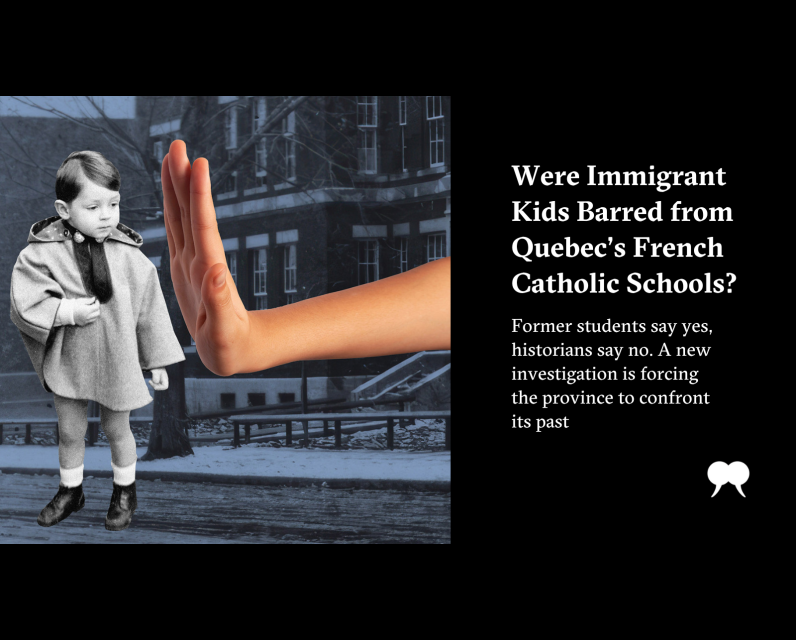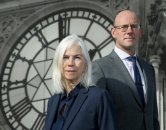Were Immigrant Kids Barred from Quebec’s French Catholic Schools?

When Claudia Ottaviano-Maheux’s parents set out to pick a school for her in 1964, the choice seemed obvious. Her father had lived in Paris before emigrating, and the family spoke only French and Italian in their Montreal home. They were also Catholic. “It seemed only natural for me to enrol in French Catholic school,” she says.
But at the registrar’s office, they were rejected. The reason: “Vous êtes des immigrants. Il faut aller à l’école anglaise.” (“You are immigrants. You must go to English school.”)
Ottaviano-Maheux struggled. “At one point, I peed my pants because I was so shy and didn’t know how to tell my teacher I needed to go to the bathroom,” she says. The first grader had so much trouble adjusting that, after a few months, she was put back in kindergarten.
For George Contaxakis, rejection came just as swiftly. He emigrated to Quebec from Egypt in 1962. His parents, who spoke Greek, Arabic, and English, tried to sign him up at Collège Français, around the corner from where they lived. “A few minutes after I was placed in a grade six class,” says Contaxakis, “the principal walked in, pointed at me, and asked, ‘Are you Catholic?’ I said, ‘No, I’m Orthodox.’ He said, ‘You’re not allowed to be here,’ and escorted me out.” The school didn’t accept Greek Orthodox students. He later enrolled at an English Protestant school.
The same message awaited families of other faiths. Miriam Zylberstein arrived in 1951 from Russia, by way of Paris and Poland. When her father tried to register her in grade three, he was told that, as a Jew, she would have to go to an English Protestant school.
These exclusions weren’t simply strokes of bad luck; they reveal what appears to be a larger impulse to protect francophone identity. Deemed outside the French Canadian fold, immigrant children risked diluting the fragile project of cultural survival. Whatever the reason, the consequences of not admitting them were far reaching. By channelling these students into the English system, Quebec’s Catholic schools may have unwittingly anglicized multitudes of newcomers. Over time, that diversion swelled the province’s anglophone ranks, deepening the divide between its two solitudes.
For many Quebecers, however, these incidents are nothing more than folklore. In an influential 1997 paper, historian Robert Gagnon set out to dismantle the claim that immigrant children were ever turned away. Such refusals were impossible, he argues, as French Catholic schools were legally required to admit all applicants. If immigrants ended up being taught in English, it’s because they picked the language for social mobility and better educational opportunities.
Gagnon has become the most frequently cited authority among denialists. As fiercely as immigrant families recall being shunted into English Protestant classrooms, many in the French-speaking majority just as fiercely cast those families as having freely chosen English in pursuit of economic advantage. The stories clash. They also feed each other. For immigrants, the wound was exclusion. For francophones, it was easier to believe immigrants snubbed French than to admit they had been shut out. That belief shifted blame outward, reinforcing the idea that the language was under siege by outsiders, rather than weakened by misdirected gatekeeping.
Guy Rex Rodgers, a Montreal writer and filmmaker, has been surveying the experiences of immigrant children who arrived before 1977. He has just completed the first tranche of a two-year report on the refusals—a study that is, in large part, a direct challenge to Gagnon’s claims. “Gagnon made the bold affirmation,” writes Rodgers in his report, “that not a single immigrant student was refused admission to French Catholic schools. Not one.”
That conclusion is understandably upsetting to immigrants who remember it differently. “It’s infuriating,” says Ottaviano-Maheux. “It was such a traumatic experience for me—and then to be told that it never happened. Why would I make that up?”
Ottaviano-Maheux is one of seventy-five former students who have shared their memories with Rodgers. Together, they leave little doubt. The refusals weren’t myth, and the record can no longer pretend otherwise.
When Rodgers arrived in Quebec in 1980, he never planned to stay. Four decades later, as co-founder of the English Language Arts Network, he turned his outsider’s perspective into an exploration of the fictions about English-speaking Quebecers. His first foray was a document, released in 2022, called “What We Choose to Remember.” Interviewing more than sixty people across six waves of immigration—from families rooted since the Napoleonic era to recent arrivals—Rodgers highlights a community far more diverse than the “privileged elite” caricature. The film was Rodgers’s way of “setting the record straight”: anglophones not as outsiders but integral to Quebec’s fabric.
“Quebec is the land of ‘Je me souviens,’” Rodgers tells me, “yet it’s remarkable what its inhabitants do not remember or have chosen to forget.”
Rodgers’s interim report, finished several weeks ago, is another stab at clearing the air, this time about immigrants being excluded from French-language education, primarily during the 1950s and ’60s. The conviction that it was immigrants who rejected Quebec’s French language and culture was, in fact, a driving force behind Bill 101, the Charter of the French Language, which established French as the official language of the province and significantly restricted access to English schools. Rodgers’s research covers the time frame from 1945 to 1977, when Quebec adopted the law. At that point, reception classes (“classes d’accueil”) took off in Montreal, transforming French schools by welcoming more allophone students and making them less homogeneous.
That continues today. A study from the Office québécois de la langue française found the percentage of Quebec’s allophone population that attends French schools rose from 79 percent in 2000 to 92 percent in 2021.
In a sense, Bill 101 was a triumph built on an inversion: recasting clerical discrimination as rejection by immigrants. Flipping the narrative gave French Quebecers a clear scapegoat and provided absolution for any complicity in the anglicization of immigrants: francophones were the victims—victims of a society where English carried the future and French carried the past. Bill 101 was a defensive wall against being rendered irrelevant in their own land.
The real role immigrants played in that narrative is what Rodgers sought to untangle. “No one claims that all immigrants were denied admission to French Catholic schools,” Rodgers writes in his report, nor does he deny some immigrants preferred English schools. He notes such schools often had greater resources and that families chose them for many reasons other than religion or language—proximity being one. The point, he argues, is that some immigrants did choose French Catholic schools and were turned away. This, he argues, is what accounts for the fact that their enrolment in French Catholic schools dropped steeply between the 1930s and ’70s.
Rodgers points to one major issue with Gagnon’s research. Bureaucrats, administrators, historians, and statisticians were consulted. Parents and students were not. It’s why Rogers decided to make the latter the primary focus of his research project. Judging by the testimonials, patterns emerge. Of those Rodgers interviewed, many Catholic students, most non-Catholic students, and almost all non-Christian students who tried to register in French Catholic schools were turned away. However, problems could arise if the English school that immigrant families were directed to was Protestant and did not accept Catholics.
“If the only options available were between a French Catholic or English Protestant school,” Rodgers asks, “what was an allophone family to do after being rejected by both schools?” He cites an example of an English Protestant school admitting an immigrant student only on the condition that the parents sign a form renouncing their Catholic religion. “A standard form was available for this bureaucratic renunciation of faith,” he says. (Religious qualifiers for Quebec’s school boards ended in 1997, when an amendment to the Education Act replaced faith-based boards with linguistic ones.)
Like Rodgers, criminal defence lawyer Ralph Mastromonaco wants to challenge the prevailing narrative around the exclusions. In April, he launched a petition asking the Quebec government to acknowledge what happened and express its regret. “I think it’s important that, as Quebecers, we own all of our history,” he explains. “Not just selective excerpts. First, we were rejected, and then years later, you’re blaming me for going to the school you told me to go to?”
The controversy matters because it reveals Quebec’s enduring insecurity. It shows how fiercely the province wants to believe that French was rejected and how fraught its relationship with anglophones remains. “There are many living witnesses to what happened,” Mastromonaco says. “But it’s either not broadly acknowledged or it’s trivialized, perceived as anecdotal and insignificant. But it wasn’t anecdotal, and it wasn’t insignificant.”
Mastromonaco says Quebec’s language debate ignores any consideration of the social choices made by the francophone majority before the 1977 adoption of the French-language charter and the consequences of those choices on the evolution of the language in Quebec. “It’s not to blame anyone,” he says, “but to simply acknowledge this happened. Can we please abandon this adversarial approach to language policy in Quebec and achieve honesty in policy discussions?”
Such flashpoints are not new. In 1968, during the Saint-Léonard school crisis—when Italian parents of the borough pushed for continued bilingual education and francophones demanded French-only schools—then Quebec premier Daniel Johnson condemned the Montreal Catholic School Board for forcing immigrant children into French schools instead of allowing them to integrate voluntarily. They had “never had this chance,” he once told a journalist, according to the Montreal Gazette, because the board once “automatically rejected anything that is not French-Canadian Catholic.”
This automatic rejection Johnson referenced is precisely what immigrants have been pointing to for over fifty years. “I’m so tired of the reductive narrative that immigrants sided with the language of our conquerors because they were looking for upwards social mobility for their children,” says Mastromonaco. “My mom wasn’t looking for upwards social mobility when she walked me to the French school nearest to our house in Notre-Dame-de-Grâce, which I was promptly rejected from.”
While Mastromonaco hopes the government eventually responds to his petition and acknowledges what happened, his main wish is for a “common-sense discussion,” where Quebecers stop disregarding over fifty years of linguistic progress. “We all learned French,” he says. “Even those who went to English schools. And they certainly ensured that their children learned French.”
As a former school commissioner for nine years, Mastromonaco says he’s personally seen that the number one preoccupation among English-speaking and allophone parents was, and continues to be, “acquiring French-language proficiency.” He finds it discouraging that immigrants are still being perceived as undermining the vitality of the French language. “It’s completely unfounded,” he says. “It was unfounded in the ’60s, and it’s unfounded now.”
The post Were Immigrant Kids Barred from Quebec’s French Catholic Schools? first appeared on The Walrus.


Comments
Be the first to comment